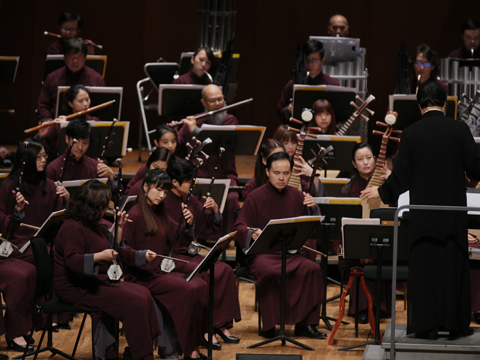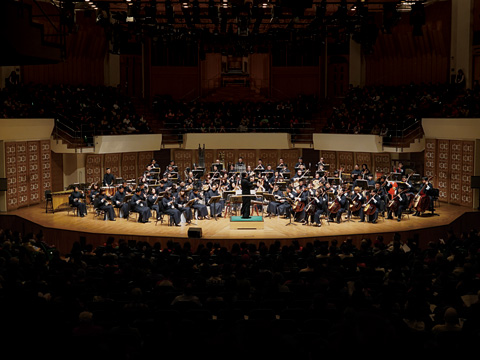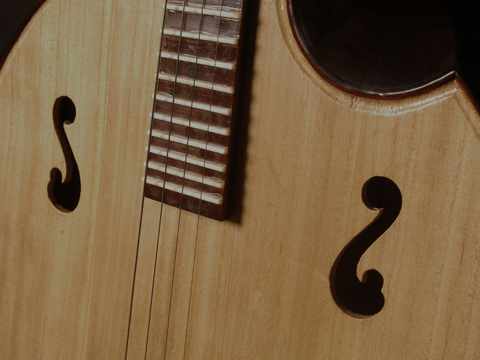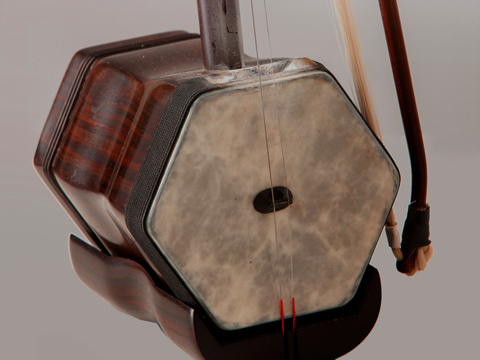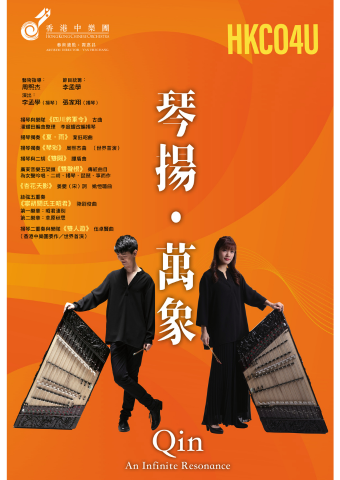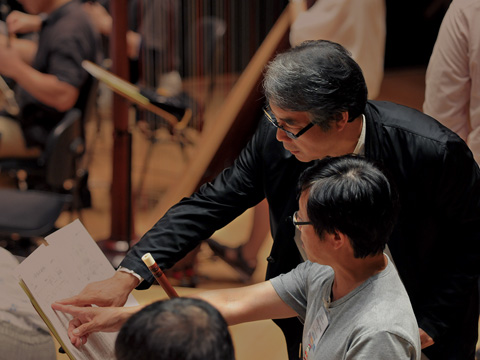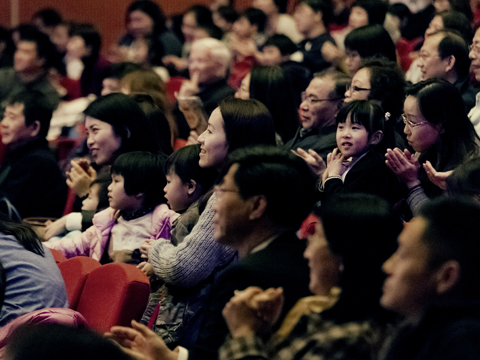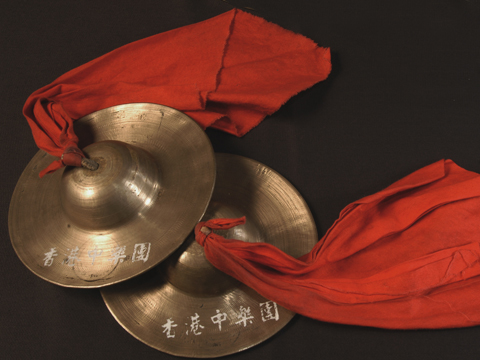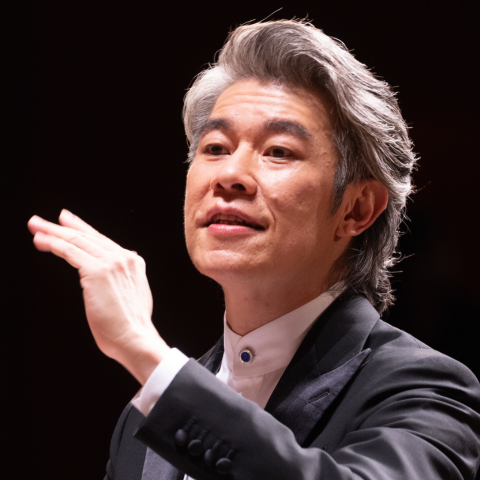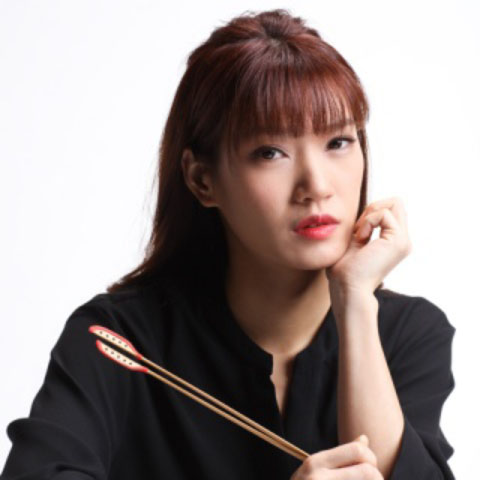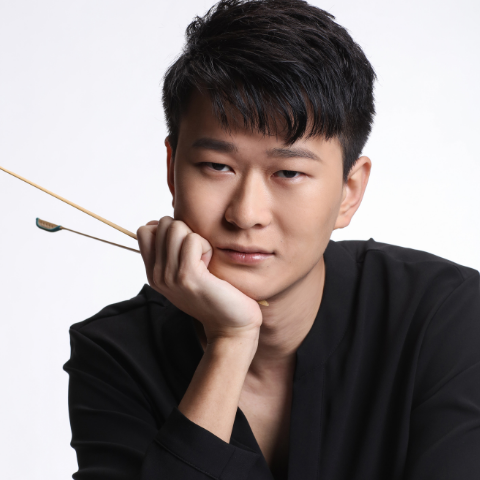Yangqin and orchestra Sichuan Song of the General Ancient Melody
Yangqin arrangement by Tommy Li Arranged by Phoon Yew Tien
This melody is a well-known classic passed down in Sichuan, hence its title Sichuan Song of the General. ‘Sichuan Yangqin’ is one of the Sichuan regional genre of music, which was supposedly brought from Guangdong during the reigns of Qing dynasty emperors, Qianlong and Jiaqing. During performances the yangqin takes the lead, accompanied by guban percussion, sanxian, and huqin, and performances can include both playing and singing, creating a unique mixed-form of artistic storytelling. Song of the General is often used as the soundtrack to scenes featuring military officers or combat, or sometimes as prologue. The full piece consists of five sections:
(I) Prelude: allegro, powerful and assertive; (II) Mustering the troops and assigning orders: andante, solemn and steady; (III) Marching to the battle: andante gradually accelerating to allegro, forceful and steadfast; (IV) On the battlefield: presto, a yangqin cadenza; (V) A Triumphant return: presto, passionate and ceremonious.
This piece was adapted as yangqin solo by renowned composer Li Decai, a specialist of ‘Sichuan Yangqin’ and then further arranged by Singaporean composer Phoon Yew Tien, featuring the yangqin as a leading play with a large-scale of Chinese orchestral accompaniment.
Yangqin solo Summer Rain Ye Yuzhao
‘Summer rain soaks through spring memories; waits for the snows of winter, responds to the fallen leaves of autumn; yet the shifting seasons cannot halt the changes brought by time.’
Composed in July 2020, Summer Rain is a work of light music for yangqin featuring a gorgeous and elegant style. The piece conveys a rich range of emotions, warmth, melancholy and longing, and it does not over-exaggerate the technique but to offer the most natural expression of the wonderful sound of the yangqin.
Yangqin solo Splendid Melodies Chew Hee Chiat (World Premiere)
Originally an examination piece for HKCO, the composer has reworked this piece to include complex rhythmic changes and sophisticated technical sections that showcase the performer’s talents and demonstrate the yangqin’s versatility in adapting its sound and technique to play a wide range of musical styles.
Yangqin and Erhu A Poem in Two Parts Tan Dun
This is a duet for the erhu and the yangqin. The quaintness of the musical conceit and the application of modern compositional techniques come together to create musical narratives that reproduce primitive life of the ancients – how they hunt in the primeval forests, or dance with wild joy after returning with their game. The rugged, stalwart image of the ancient people, tableaux of their daily life, and robustness of their attitude are depicted through the dynamics and bowing techniques.
- provided by Szeto Kin
Canton Music, Five-piece Combo Lovers’ Sorrow Traditional Music
The present Chinese title came about in the 1950’s, and was built on the story of the Cowherd and the Weaver in the sky. The mood of profound pain and sorrow of this music is highlighted, while the lovers’ lament is told in the contrasting modes.
According to some authorities, this is the work of Wu Risheng, a famous Chinese opera ensemble leader. A person in this role in the olden days was called a ‘shangshou’, meaning ‘principal’ in the orchestra or ensemble, who plays the suona, the yueqin, etc... Lovers’ Sorrow is a title that suggests sounds of lamentation, and the work was given its title as “Shuang-Xing-Hen” after the 1950’s in mainland China, attributing to it the legend of the Weaver and the Cowherd being separated by the Milky Way and turning it into a piece of programme music. As the work is now set for the orchestra, its depth and profundity are highlighted, and the strong contrasts bring out the sorrow and regrets of the mythological lovers.
Composed for female singing, Erhu, Yangqin, Pipa, Zheng Apricot Blossoms Against a Blue Sky
Music and lyrics by Jiang Kui(Song Dynasty) Yao Henglu
Songs by the White Stone Taoist Priest by Jiang Kui (1155-1221) of the Song Dynasty is a rare example of song collections that are still extant today. There are 17 pieces written in ‘popular’ notation of the Song Dynasty, 10 in lǜlǜ (pitch-pipe) notation, and one in qin tablature. Apricot Blossoms Against a Blue Sky is among the 17 in ‘popular’ notation. It describes the poet’s mixed feeling when he passes by Jinling and sees Huaichu far off. The music is refreshing and elegant with the use of non-pentatonic notes.
Lyrics:
The green weeping willow caresses the mandarin duck pond,
I recall her face amidst the peach leaves as she called the boat to cross the river.
I cast my sad eyes to the vernal breeze, hoping to ride with it -
Leaning against the oars, I linger awhile -
The way to Jinling is bedecked with the oriole song and the dancing swallows.
Only the tides know how heavy my heart is.
The sandbar, overgrown with fragrant verdure, stops the homeward way.
The evening shroud is coming down. I move the boat - but where should one go?
String quintet Queen Wang Zhaojun Luk Wai Chun
First movement: Tearful farewell of Zhaojun
Second movement: Autumn Yearning on the Steppe
Queen Wang Zhaojun is a Quintet of Chinese stringed instrumental work commissioned by the Hong Kong Chinese Orchestra for HKPM SHOWTIME!: Classic and Women: A Tribute, a performing arts programme at the Hong Kong Palace Museum. This composition is inspired by the historical story of palace maid Wang Zhaojun, who was bestowed on Huhanye Chanyu of the Xionghu by the Emperor Yuan of Han in Han Dynasty. Queen Wang Zhaojun consists of two movements, namely ‘Tearful farewell of Zhaojun’ and ‘Autumn Yearning on the Steppe’. The music is inspired by the ancient Chinese music Zhaojun Yuan (The Complaint of Zhaojun) and the traditional pipa solo work Song of the Frontier.
The first movement ‘Tearful farewell of Zhaojun’ mainly expresses the sorrow of Zhaojun when she knows that she will be bestowed on Huhanye Chanyu of the Xionghu by Emperor Yuan of Han. In the latter part of the movement, the gaohu imitates the Nianbai (stage speech) of zihou (soprano actress), in Cantonese opera, which present Zhaojun's panic and helplessness when she learned that the Han Emperor chose her for Huhanye. The second movement ‘Autumn Yearning on the Steppe’ expresses Zhaojun's feelings after living on the steppe over the frontier with Huhanye and her desire to return to the Han, and at the same time affirms the marriage of Zhaojun in enhancing the friendly and trustworthy relationship between Han and Xionghu. The gaohu melody in this movement incorporates the characteristics of Mongolian long song, while the yangqin imitates the clatter of the horse's hooves on the grassland.
Yangqin duet and Orchestra Play and Travel Ng Cheuk-yin (Commissioned by the HKCO / World Premiere)
Play and Travel is composed for a yangqin duet accompanied by small orchestra. It is inspired by the combined competition and collaboration of two-player games in which the players go through all sorts of challenges and adventures, and entertain themselves along the way.
- Ng Cheuk-yin

